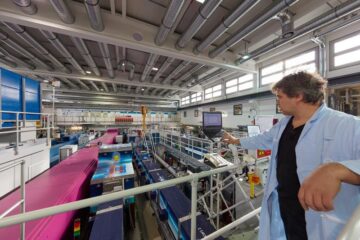New technology for decentralised production of bioethanol developed in Finland

Agricultural and food production by-products transformed into ethanol at the site of origin
The Technical Research Centre of Finland (VTT) is currently developing a new process for producing ethanol from agricultural and food production by-products at the site of origin.
Based on fermentation combined with evaporation, the continuous process provides a 40% ethanol-water mixture that can, among other things, be refined as a fuel and mixed with petrol.
The process also produces almost pure water. The amount and quality of unfermented raw material can be controlled, offering several opportunities for utilisation.
The method’s investment and operating cost for each ton of produced ethanol is also competitive in small-scale production. Technically, the process is more easily applicable to decentralised ethanol production than the techniques used in large ethanol production plants.
The process is very environmentally friendly. The produced ethanol fuel helps reduce greenhouse gases and the amount of waste and wastewater resulting from agriculture and food production. The process therefore supports both the Kyoto objectives and the waste directives gradually being introduced in the EU.
By-products from the Finnish potato, bakery and dairy product industries can yield approximately 30,000 tons of ethanol. This corresponds to approximately one quarter of the amount of biofuel which, according to the EU objectives, should be added to liquid fuels in Finland in 2005.
The development project has received funding from the Ministry of Agriculture and Forestry’s research budget. Several industrial enterprises have also been involved. After successful laboratory and pilot plant runs, the aim is to introduce the process on a pilot scale before the end of the year.
Media Contact
Weitere Informationen:
http://www.vtt.fiAlle Nachrichten aus der Kategorie: Ökologie Umwelt- Naturschutz
Dieser Themenkomplex befasst sich primär mit den Wechselbeziehungen zwischen Organismen und den auf sie wirkenden Umweltfaktoren, aber auch im weiteren Sinn zwischen einzelnen unbelebten Umweltfaktoren.
Der innovations report bietet Ihnen interessante Berichte und Artikel, unter anderem zu den Teilbereichen: Klimaschutz, Landschaftsschutzgebiete, Ökosysteme, Naturparks sowie zu Untersuchungen der Leistungsfähigkeit des Naturhaushaltes.
Neueste Beiträge

Bakterien für klimaneutrale Chemikalien der Zukunft
Forschende an der ETH Zürich haben Bakterien im Labor so herangezüchtet, dass sie Methanol effizient verwerten können. Jetzt lässt sich der Stoffwechsel dieser Bakterien anzapfen, um wertvolle Produkte herzustellen, die…

Batterien: Heute die Materialien von morgen modellieren
Welche Faktoren bestimmen, wie schnell sich eine Batterie laden lässt? Dieser und weiteren Fragen gehen Forschende am Karlsruher Institut für Technologie (KIT) mit computergestützten Simulationen nach. Mikrostrukturmodelle tragen dazu bei,…

Porosität von Sedimentgestein mit Neutronen untersucht
Forschung am FRM II zu geologischen Lagerstätten. Dauerhafte unterirdische Lagerung von CO2 Poren so klein wie Bakterien Porenmessung mit Neutronen auf den Nanometer genau Ob Sedimentgesteine fossile Kohlenwasserstoffe speichern können…





















